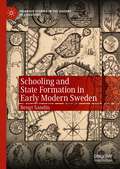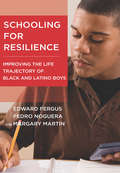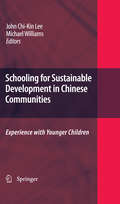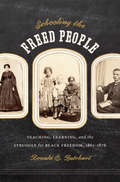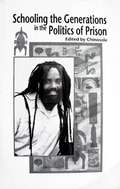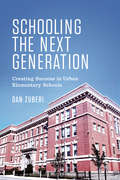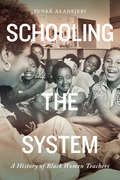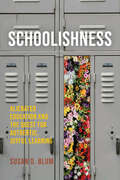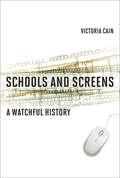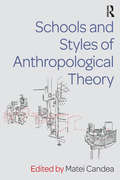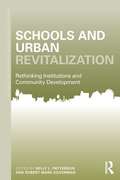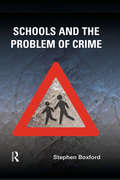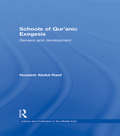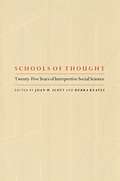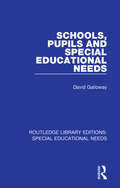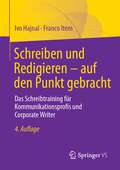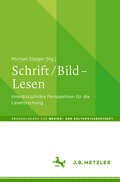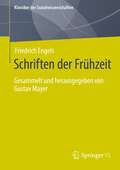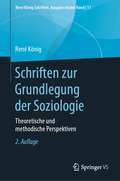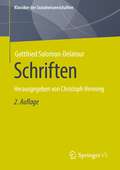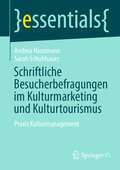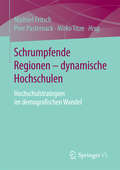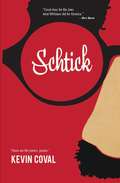- Table View
- List View
Schooling and State Formation in Early Modern Sweden (Palgrave Studies in the History of Childhood)
by Bengt SandinIn this book the emergence of schools in urban Sweden between the seventeenth and the nineteenth century provides the framework for a history of children and of childhood. It is a study through the lens of the changes in early modern education, spatial aspect of the life of children and systems of governance in the early modern Swedish state. Educational systems defined the spatial aspects of childhood—where children were supposed to grow up, in the home, the school, the streets and alleys, or the place of work—over a period of about two hundred years. Schools and education represent both a mental and a physical space; an abstract place for children as well as a local and concrete place for them, which stood out against the alternative spatial aspects of the life of children. It is also a study of how different cultural systems influence the definitions of childhood and schools, in the context of church and home instruction, poor relief, policing, surveillance, and the question of why children went to schools. It examines the role of the school as childcare and as a provider of food, shelter and welfare, and as governance.
Schooling for Resilience: Improving the Life Trajectory of Black and Latino Boys (Youth Development and Education Series)
by Pedro Noguera Edward Fergus Margary MartinAs a group, Black and Latino boys face persistent and devastating disparities in achievement when compared to their White counterparts: they are more likely to obtain low test scores and grades, be categorized as learning disabled, be absent from honors and gifted programs, and be overrepresented among students who are suspended and expelled from school. They are also less likely to enroll in college and more likely to drop out. Put simply, they are among the most vulnerable populations in our schools.Schooling for Resilience investigates how seven newly formed schools, created specifically to serve boys of color, set out to address the broad array of academic and social problems faced by Black and Latino boys. Drawing on student and teacher surveys, focus groups, interviews, and classroom observations, the authors investigate how these schools were developed, what practices they employed, and how their students responded academically and socially. In particular, they focus on the theory of action that informed each school&’s approach to educating Black and Latino boys and explore how choices about school structure and culture shaped students&’ development and achievement. In doing so, the authors identify educational strategies that all schools can learn from. This thoughtful, passionately argued volume promises to influence efforts to improve the achievement and life outcomes of Black and Latino boys for years to come.
Schooling for Sustainable Development in Chinese Communities
by Michael Williams John Chi-Kin LeeThis book focuses on the academic foundations, trends and traditions of environmental education for sustainable development principally in Chinese contexts. It highlights contexts and case studies that illuminate recent Chinese initiatives. It includes case studies of green schools and reports on recent initiatives in school-based ESD curriculum development programmes in China, Hong Kong, Macao and Taiwan. The book concludes with an overview chapter that points to likely future developments. The assumption underpinning the book is that experiences gained in such a major country as China will be of real interest to geographical and environmental educationists, professional educators and teachers elsewhere. Not only will it generate interest and create greater awareness but also it is hoped that these experiences will provide a platform for scholarly exchange and contribute insights on education policy and curriculum changes across Asian-Pacific communities in an increasingly globalised world.
Schooling the Freed People: Teaching, Learning, and the Struggle for Black Freedom, 1861-1876
by Ronald E. ButchartConventional wisdom holds that freedmen's education was largely the work of privileged, single white northern women motivated by evangelical beliefs and abolitionism. Schooling the Freed People shatters this notion entirely. For the most comprehensive quantitative study of the origins of black education in freedom ever undertaken, Ronald E. Butchart combed the archives of all of the freedmen's aid organizations as well as the archives of every southern state to compile a vast database of over 11,600 individuals who taught in southern black schools between 1861 and 1876. Based on this path-breaking research, he reaches some surprising conclusions: one-third of the teachers were African Americans; black teachers taught longer than white teachers; half of the teachers were southerners; and even the northern teachers were more diverse than previously imagined. His evidence demonstrates that evangelicalism contributed much less than previously believed to white teachers' commitment to black students, that abolitionism was a relatively small factor in motivating the teachers, and that, on the whole, the teachers' ideas and aspirations about their work often ran counter to the aspirations of the freed people for schooling. The crowning achievement of a veteran scholar, this is the definitive book on freedmen's teachers in the South as well as an outstanding contribution to social history and our understanding of African American education.
Schooling the Generations in the Politics of Prison
by ChinosoleSchooling the Generations in the Politics of Prison
Schooling the Next Generation
by Dan ZuberiPublic schools are among the most important institutions in North American communities, especially in disadvantaged urban neighbourhoods. At their best, they enable students to overcome challenges like poverty by providing vital literacy and numeracy skills. At their worst, they condemn students to failure, both economically and in terms of preparing them to be active participants in a democratic society.In Schooling the Next Generation, Dan Zuberi documents the challenges facing ten East Vancouver elementary schools in diverse lower-income communities, as well as the ways their principals, teachers, and parents are overcoming these challenges. Going beyond the façade of standardized test scores, Zuberi identifies the kinds of school and community programs that are making a difference and could be replicated in other schools. At the same time, he calls into question the assumptions behind a test score-driven search for "successful schools." Focusing on early literacy and numeracy skills mastery, Schooling the Next Generation presents a slate of policy recommendations to help students in urban elementary schools achieve their full potential.
Schooling the System: A History of Black Women Teachers (Rethinking Canada in the World #8)
by Funké AladejebiIn post–World War II Canada, black women’s positions within the teaching profession served as sites of struggle and conflict as the nation worked to address the needs of its diversifying population. From their entry into teachers’ college through their careers in the classroom and administration, black women educators encountered systemic racism and gender barriers at every step. So they worked to change the system.Using oral narratives to tell the story of black access and education in Ontario between the 1940s and the 1980s, Schooling the System provides textured insight into how issues of race, gender, class, geographic origin, and training shaped women’s distinct experiences within the profession. By valuing women’s voices and lived experiences, Funké Aladejebi illustrates that black women, as a diverse group, made vital contributions to the creation and development of anti-racist education in Canada. As cultural mediators within Ontario school systems, these women circumvented subtle and overt forms of racial and social exclusion to create resistive teaching methods that centred black knowledges and traditions. Within their wider communities and activist circles, they fought to change entrenched ideas about what Canadian citizenship should look like.As schools continue to grapple with creating diverse educational programs for all Canadians, Schooling the System is a timely excavation of the meaningful contributions of black women educators who helped create equitable policies and practices in schools and communities.
Schoolishness: Alienated Education and the Quest for Authentic, Joyful Learning
by Susan D. BlumIn Schoolishness, Susan D. Blum continues her journey as an anthropologist and educator. The author defines "schoolishness" as educational practices that emphasize packaged "learning," unimaginative teaching, uniformity, constant evaluation by others, arbitrary forms, predetermined time, and artificial boundaries, resulting in personal and educational alienation, dependence, and dread.Drawing on critical, progressive, and feminist pedagogy in conversation with the anthropology of learning, and building on the insights of her two previous books Blum proposes less-schoolish ways of learning in ten dimensions, to lessen the mismatch between learning in school and learning in the wild. She asks, if learning is our human "superpower," why is it so difficult to accomplish in school? In every chapter Blum compares the fake learning of schoolishness with successful examples of authentic learning, including in her own courses, which she scrutinizes critically.Schoolishness is not a pedagogical how-to book, but a theory-based phenomenology of institutional education. It has moral, psychological, and educational arguments against schoolishness that, as Blum notes, "rhymes with foolishness."
Schools Then and Now
by Cynthia Swain Tara FunkWhat were some schools like long ago? How are schools different today?
Schools and Screens: A Watchful History
by Victoria CainWhy screens in schools—from film screenings to instructional television to personal computers—did not bring about the educational revolution promised by reformers.Long before Chromebook giveaways and remote learning, screen media technologies were enthusiastically promoted by American education reformers. Again and again, as schools deployed film screenings, television programs, and computer games, screen-based learning was touted as a cure for all educational ills. But the transformation promised by advocates for screens in schools never happened. In this book, Victoria Cain chronicles important episodes in the history of educational technology, as reformers, technocrats, public television producers, and computer scientists tried to harness the power of screen-based media to shape successive generations of students. Cain describes how, beginning in the 1930s, champions of educational technology saw screens in schools as essential tools for training citizens, and presented films to that end. (Among the films screened for educational purposes was the notoriously racist Birth of a Nation.) In the 1950s and 1960s, both technocrats and leftist educators turned to screens to prepare young Americans for Cold War citizenship, and from the 1970s through the 1990s, as commercial television and personal computers arrived in classrooms, screens in schools represented an increasingly privatized vision of schooling and civic engagement. Cain argues that the story of screens in schools is not simply about efforts to develop the right technological tools; rather, it reflects ongoing tensions over citizenship, racial politics, private funding, and distrust of teachers. Ultimately, she shows that the technologies that reformers had envisioned as improving education and training students in civic participation in fact deepened educational inequities.
Schools and Styles of Anthropological Theory
by Matei CandeaThis book presents an overview of important currents of thought in social and cultural anthropology, from the 19th century to the present. It introduces readers to the origins, context and continuing relevance of a fascinating and exciting kaleidoscope of ideas that have transformed the humanities and social sciences, and the way we understand ourselves and the societies we live in today. Each chapter provides a thorough yet engaging introduction to a particular theoretical school, style or conceptual issue. Together they build up to a detailed and comprehensive critical introduction to the most salient areas of the field. The introduction reflects on the substantive themes which tie the chapters together and on what the very notions of ‘theory’ and ‘theoretical school’ bring to our understanding of anthropology as a discipline. The book tracks a core lecture series given at Cambridge University and is essential reading for all undergraduate students undertaking a course on anthropological theory or the history of anthropological thought. It will also be useful more broadly for students of social and cultural anthropology, sociology, human geography and cognate disciplines in the social sciences and humanities.
Schools and Urban Revitalization: Rethinking Institutions and Community Development (Community Development Research and Practice Series)
by Robert Mark Silverman Kelly L. PattersonNew research in community development shows that institutions matter. Where the private sector disinvests from the inner city, public and nonprofit institutions step in and provide engines to economic revitalization and promote greater equity in society. Schools and Urban Revitalization collects emerging research in this field, with special interest in new school-neighborhood partnerships that lead today’s most vibrant policy responses to urban blight.
Schools and the Problem of Crime
by Stephen BoxfordWhat causes young people to offend? What influence do schools have on young peoples' offending behaviour in relation to other possible causal factors? These critical criminological and educational questions are addressed in Schools and the Problem of Crime. The book examines the causes of offending in the school context among 3,103, male and female, Year 10 pupils (age 14-15), in twenty state schools in Cardiff. The findings of one of the largest empirical studies of its kind in the UK are used to examine the role of schools, family background, neighbourhood, young peoples' social situation and dispositions, and lifestyles on pupils' offending behaviour. Critically, the interplay and relationships between these causal factors are disentangled in gaining a greater understanding as to why some young people offend in the school context and why some young people do not, as well as examining why some schools experience higher offending rates than others. The book employs an integrative analytical approach which is theoretically led. Through gaining an understanding of the factors that cause young people to offend it is envisaged that future crime prevention strategies can be better informed and targeted. major contribution to understanding youth crime and delinquency on basis of major Cambridge University research study focus on lifestyle factors important policy implications
Schools of Qur'anic Exegesis: Genesis and Development (Culture and Civilization in the Middle East)
by Hussein Abdul-RaofQur’anic exegesis has become the battleground of political Islam and theological conflict among various Muslim schools of thought. Using comparative and contrastive methodology, examples from the Qur'an are investigated in the light of various theological views to delineate the birth, development and growth of Qur'anic exegesis. The political status quo, in the past and at present, has impinged upon Qur’anic exegesis more than on any other discipline in Islamic studies. This book illustrates the dichotomy between mainstream and non-mainstream Islam, showing how Qur’anic exegesis reflects the subtle dogmatic differences and political cleavages in Islamic thought. Chapters explore in depth the intrusive views of the compilers of early exegesis manuscripts, the scepticism among Western scholars about the authenticity of early Muslim works of exegesis and of prophetic tradition, and the role of exegesis as a tool to reaffirm the Qur’an as a canon. Written to appeal to those with comparative exegetical interests as well as those focused on Islamic studies in general, this book will be an important reference for research students, scholars, and students of Islamic Studies, Theology, Religious studies and Middle Eastern Studies.
Schools of Thought: Twenty-Five Years of Interpretive Social Science
by Joan W. Scott & Debra KeatesSchools of Thought brings together a cast of prominent scholars to assess, with unprecedented breadth and vigor, the intellectual revolution over the past quarter century in the social sciences. This collection of twenty essays stems from a 1997 conference that celebrated the twenty-fifth anniversary of the Institute for Advanced Study's School of Social Science. The authors, who represent a wide range of disciplines, are all associated with the School's emphasis on interpretive social science, which rejects models from the hard sciences and opts instead for a humanistic approach to social inquiry. Following a preface by Clifford Geertz, whose profound insights have helped shape the School from the outset, the essays are arranged in four sections. The first offers personal reflections on disciplinary changes; the second features essays advocating changes in focus or methodology; the third presents field overviews and institutional history; while the fourth addresses the link between political philosophy and world governance. Two recurring themes are the uses (and pitfalls) of interdisciplinary studies and the relation between scholarship and social change. This book will be rewarding for anyone interested in how changing trends in scholarship shape the understanding of our social worlds. The contributors include David Apter, Kaushik Basu, Judith Butler, Nicholas Dirks, Jean Elshtain, Peter Galison, Wolf Lepenies, Jane Mansbridge, Andrew Pickering, Mary Poovey, Istvan Rev, Renato Rosaldo, Michael Rustin, Joan W. Scott, William H. Sewell, Jr., Quentin Skinner, Charles Taylor, Anna Tsing, Michael Walzer, and Gavin Wright.
Schools, Pupils and Special Educational Needs (Routledge Library Editions: Special Educational Needs #24)
by David GallowayFirst published in 1985. This book examines in-depth the administrative, curricular, attitudinal and pastoral care changes that are needed if teachers in ordinary schools are to meet their pupils’ special needs successfully. Drawing on extensive research the author shows that the needs of a minority of ‘special’ pupils cannot sensibly be seen in insolation from those of the other pupils in the school. Schools that cater successfully for the majority of their pupils with special needs. Conversely, the curriculum and organisational problems in some schools create tensions which are reflected in the pupils’ poor behaviour and performance. These are taken as evidence that the pupils have special needs.
Schreiben und Redigieren – auf den Punkt gebracht: Das Schreibtraining für Kommunikationsprofis und Corporate Writer
by Ivo Hajnal Franco ItemDas Buch bietet professionellen Schreiberinnen und Schreibern praxisnahe Anregungen, eigene wie fremde Texte zu optimieren. Ein professioneller Sprachgebrauch hält sich an klare, objektive Vorgaben. Dementsprechend beruht dieses Buch auf empirischen Daten zur Verständlichkeit von Unternehmens- und Medientexten, die in eine leicht umzusetzende Checkliste münden.
Schrift / Bild – Lesen: Interdisziplinäre Perspektiven für die Leseforschung (Abhandlungen zur Medien- und Kulturwissenschaft)
by Michael StaigerIm Zuge der gegenwärtigen Transformation hin zu einer digitalen, multimodal dominierten Medienkultur vollzieht sich ein Wandel des Lesens. Dieser betrifft nicht nur die Lesemedien und die Rezeptionsbedingungen, sondern auch die Medialität und Materialität von Texten. Im Mittelpunkt des Bandes steht die Frage, wie Texte gelesen werden, die Schrift und Bilder miteinander kombinieren. Vorgestellt werden Zugänge aus den Literatur-, Buch- und Medienwissenschaften, aus der Multimodalitätsforschung und Kognitionspsychologie sowie aus Kunstwissenschaft und Deutschdidaktik. Ziel ist es, das Forschungsfeld des Schrift-Bild-Lesens abzustecken und einen Beitrag zu seiner theoretischen Grundlegung zu leisten.
Schriften der Frühzeit: Gesammelt und herausgegeben von Gustav Mayer (Klassiker der Sozialwissenschaften)
by Friedrich EngelsDer Band macht die frühen Schriften Friedrich Engels wieder zugänglich. Gesammelt und herausgegeben von Gustav Mayer.
Schriften zur Grundlegung der Soziologie: Theoretische und methodische Perspektiven (René König Schriften. Ausgabe letzter Hand #11)
by René KönigDieser Band versammelt René Königs Überlegungen zur theoretischen und methodischen Grundlegung der Soziologie. In ihrer Gestalt als spezifische empirische Einzelwissenschaft will diese Soziologie "nichts als Soziologie" sein; dies schließt aber nicht aus, dass in der Soziologie, wie sie René König betreibt, den Erkenntnissen der Human- und Kulturwissenschaften eine zentrale theoretische Funktion zukommt. Auch zu grundsätzlichen erkenntnistheoretischen und methodologischen Problemen sowie zu Fragen einer Ethik der empirischen Soziologie und Sozialforschung nimmt König dezidiert Stellung.
Schriften zur Wissenschaftslehre und Kultursoziologie: Herausgegeben und eingeleitet von Peter Gostmann und Alexandra Ivanova (Klassiker der Sozialwissenschaften)
by Emil LedererDie Schriften von Emil Lederer zur Wissenschaftslehre stellen unverändert eine wichtige Ressource für die soziologische Grundlagenforschung dar. Seine kultursoziologischen Schriften sind ein wertvoller Leitfaden für die Gegenwartsanalysen heutiger Soziologinnen und Soziologen; zugleich bieten sie dem historisch interessierten Leser die Möglichkeit, einen vertieften Einblick in die Diskussionslage zwischen Sozialwissenschaften und Politik in der ersten Hälfte des 20. Jahrhunderts zu gewinnen.
Schriften: Herausgegeben von Christoph Henning (Klassiker der Sozialwissenschaften)
by Gottfried Salomon-DelatourGottfried Salomon-Delatour (1892-1964), ein heute fast vergessener Soziologe, promovierte 1916 bei Georg Simmel in Straßburg und war anschließend in Frankfurt Assistent von Franz Oppenheimer am ersten deutschen Lehrstuhl für Soziologie. In den 1920er Jahren war er als Herausgeber des „Jahrbuchs für Soziologie“ und Organisator der Davoser Hochschulkurse ferner mit fast allen Größen des Faches auch persönlich bekannt. Seit 1933 im Exil, war er weiter aktiv – auch politisch – und kehrte 1958 nach Frankfurt zurück. Er stellt ein Bindeglied zwischen seinen Lehrern Simmel und Oppenheimer einerseits und jüngeren Intellektuellen wie Benjamin und Adorno sowie den Studierenden der 1960er Jahre andererseits dar. Derzeit wird er auch als deutsch-französischer „Vermittler“ wiederentdeckt. Dieser Band macht einige seiner interessantesten Schriften erneut verfügbar. Darunter befinden sich einerseits einige „investigative“ Vorworte zu Herausgaben damals wenig bekannter internationaler „Klassiker“ der Soziologie und andererseits – neben Aufsätzen zu spezifisch jüdischen Themen – auch bewegende Dokumente aus seiner Zeit im Exil.
Schriftliche Besucherbefragungen im Kulturmarketing und Kulturtourismus: Praxis Kulturmanagement (essentials)
by Andrea Hausmann Sarah SchuhbauerDieses essential erläutert fundiert und kompakt die schriftliche Besucherbefragung als Instrument im Kulturmarketing und Kulturtourismus. Nach einer Einführung in die wichtigsten Begriffe werden die beiden Methoden schriftlicher Befragungen (Paper-Pencil und Online) anwendungsbezogen vorgestellt und auf ihre Stärken und Schwächen untersucht. Hierauf aufbauend werden die einzelnen Phasen von schriftlichen Befragungen – von der Gestaltung eines Fragebogens und der Datenerhebung über die Datenaufbereitung und -auswertung bis hin zur Follow-up-Phase – skizziert. Die theoretischen Erläuterungen werden anhand vieler aktueller Beispiele aus der Praxis von Kultur und Tourismus illustriert.
Schrumpfende Regionen - dynamische Hochschulen
by Michael Fritsch Peer Pasternack Mirko TitzePolitik und andere Akteure in den (vor allem ostdeutschen) Regionen stehen vor der Aufgabe, den demografischen Wandel zu gestalten. Dabei sollen sie zugleich die Voraussetzungen für ,,selbsttragende Entwicklungen" und ,,gleichwertige Lebensverhältnisse" schaffen - und dies unter Bedingungen bis 2020 deutlich abgesenkter Landeshaushalte. Vor dem Hintergrund dieser Herausforderungen werden Optionen für die Regionalentwicklung aufgezeigt, die im Zusammenhang mit Hochschulen stehen.
Schtick
by Kevin CovalSchtick is a tale of Jewish assimilation and its discontents: a sweeping exposition on Jewish American culture in all its bawdy, contradictory, inventive glory. Exploring-in his own family and in culture and politics at large-how Jews have shed their minority status in the United States, poet Kevin Coval shows us a people's transformation out of diaspora, landing on both sides of the color line.
